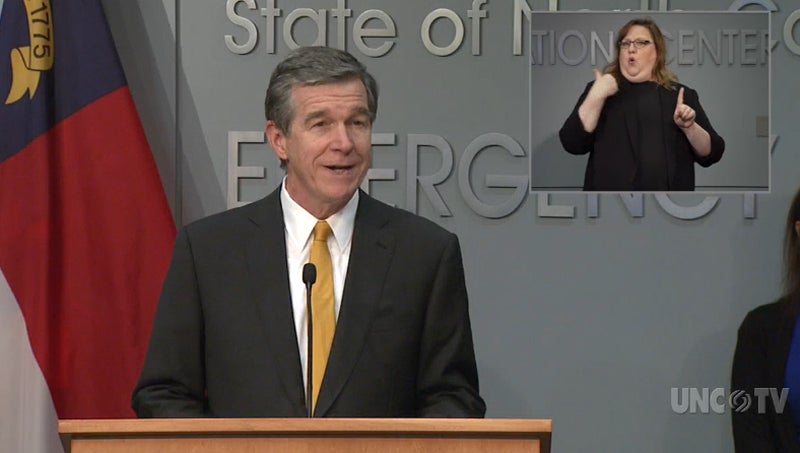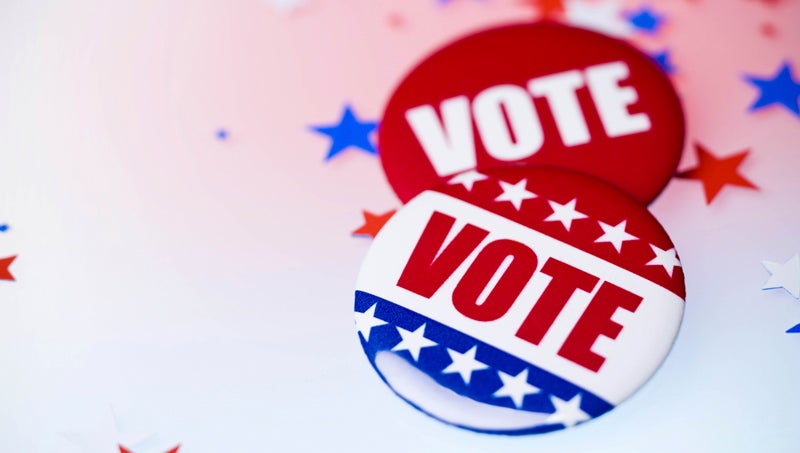Governor: Lifting restrictions depends on testing, tracing and trends
Published 5:37 pm Wednesday, April 15, 2020

- (UNC-TV)
|
Getting your Trinity Audio player ready...
|
As North Carolina’s economy struggles, Gov. Roy Cooper says easing state-mandated restrictions on businesses and travel depends on three factors — additional testing for the virus, more robust contact tracing efforts and an overall downward trend in COVID-19 cases.
“There’s no perfect sequence or timing for reopening, but there is health guidance, business guidance and common sense,” Cooper said during a press briefing Friday. “We’ll put those together with each of our three areas — testing, tracing and trends — to make those decisions and get people back to work.”
On Thursday, the federal government outlined new guidelines for reopening the U.S. economy. The plan is predicated on three factors — a downward trajectory in COVID-like symptomatic cases, a downward trajectory of positive tests and documented cases and hospitals being able to treat all patients without crisis care.
From there, the federal plan lays out three phases for easing social distancing and stay-at-home restrictions. Cooper said these guidelines largely line up with the state’s plans for moving forward.
“The President yesterday shared guidelines for the country to be able to re-open,” Cooper said. “It was good to see that many of the national criteria match what we’re doing here in North Carolina, but I and other governors have been clear — we still need assistance with testing supplies and PPE. The President has left the responsibility to me, as governor, to make decisions about how and when we ease restrictions in our state. I accept that.”
The first factor laid out by the state, testing, depends on additional lab capacity, and the availability of more diagnostic testing and reliable antibody testing that can show who has had the virus, even if they may have been asymptomatic. As of Friday, Cooper said 73,000 COVID-19 tests had been conducted so far. East Carolina University, Duke University and University of North Carolina-Chapel Hill will assist in this effort.
“When it comes to testing, we’re in a much better place than we were a month ago,” said N.C. Department of Health and Human Services Secretary Dr. Mandy Cohen on Wednesday. “There are more labs that are doing COVID-19 testing, wait times for results have been dramatically reduced, and the shortage of testing supplies has eased.”
Cohen said a shortage of personal protective equipment continues to be a limiting factor for testing, but new testing methods in development by the private sector could make self-administered tests a viable option.
Secondly, the governor said enhanced contact tracing will involve expanding the state’s public health workforce to help identify who has been in contact with someone who has COVID-19 so they can also get tested for the virus.
Finally, Cooper said the third factor in easing restrictions are trends in new positive cases, hospitalizations, deaths, as well as available supply of personal protective equipment and hospital capacity.
“This virus is going to be with us until there is a vaccine, which may be a year or more away,” Cooper said. “As we ease restrictions, we are going to enter a new normal. We want to get back to work while at the same time preventing that spike that’ll overwhelm our hospitals with patients.”
As the state begins to reopen, Cooper says that new normal may involve seeing people getting their temperatures checked at public events or venues, or wearing masks more in public.
“A restaurant you go into may have tables that are only partially full,” he said Wednesday. “The only sporting events or concerts that you may be able to watch for a while will have no in-person crowds.”





